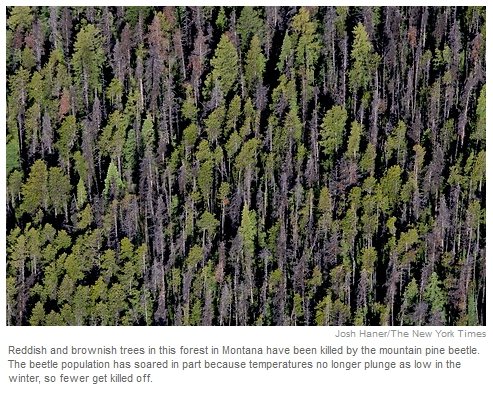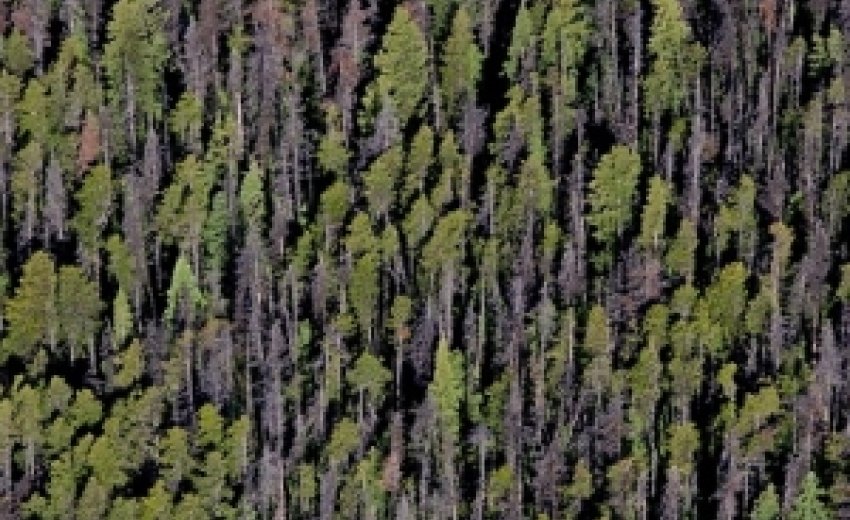
June 6, 2012: The earth could be nearing a point at which sweeping environmental changes, possibly including mass extinctions, would undermine human welfare, 22 prominent biologists and ecologists warned on Wednesday.
Acknowledging in a new paper that both the likelihood and timing of such a planetary “state shift” were uncertain, the scientists nonetheless described warning signs that it could arrive within a few human generations, if not sooner.
The problems are familiar by now: they include a planetary warming that, while slow on the scale of a human lifetime, is extremely rapid on a geologic time scale, the scientists said. And human population growth and economic expansion continue to demand new resources like energy and food, to claim new land and to cut natural landscapes into disconnected patchworks.
Humans have already converted about 43 percent of the ice-free land surface of the planet to uses like raising crops and livestock and building cities, the scientists said. Studies on a smaller scale have suggested that when more than 50 percent of a natural landscape is lost, the ecological web can collapse. The new paper essentially asks, what are the chances that will prove true for the planet as a whole?
In interviews, scientists involved in writing the paper acknowledged that the 50 percent threshold was simply a best guess, based on extrapolating the earlier research. But they said they were deeply concerned about many of the trends on the planet and the seeming inability of the world’s political leadership to grapple with them.
The situation “scares the hell out of me,” said one author of the paper, James H. Brown, who is a macroecologist at the University of New Mexico and a member of the National Academy of Sciences. “We’ve created this enormous bubble of population and economy. If you try to get the good data and do the arithmetic, it’s just unsustainable. It’s either got to be deflated gently, or it’s going to burst.”
The new paper is one of a package of articles on the global ecological situation released on Wednesday by the journal Nature as part of the lead-up to Rio+20, a global sustainability summit meeting in Rio de Janeiro. At the so-called Earth Summit in Rio 20 years ago, the nations of the world ostensibly committed themselves to broad actions to improve the environmental situation as well as reduce risks to human society. That included a promise by President George H.W. Bush that the United States would take a leading role in reducing the emissions that were causing climate change.
In the same issue of Nature, the journalists Jeff Tollefson and Natasha Gilbert come to the conclusion that the treaties that emerged from the original Rio summit “failed to achieve even a fraction of the promises that world leaders trumpeted two decades ago.”
The United States has taken only minimal steps on climate change, for instance, and global emissions have soared, not fallen, in the 20 years since the Earth Summit. Expectations for the Rio+20 conference, meant as a follow-up to the original, are low, but many environmental groups are pushing for action.
The Nature special issue was under wraps until Wednesday afternoon, and most scientists have not seen it yet. Based on history, there is little doubt that the authors of the new paper about a planetary “state shift” will be accused of alarmism.
Their work can be seen as the latest installment of an old debate between people who perceive hard ecological limits to human population and economic growth, as these authors do, and people who think innovation will ultimately save the day, as it has done so often in the past. Many economists, in particular, fall into the latter camp. We have explored the parameters of this debate in the context of the food supply.
Yet the authors marshal clear examples of ecological disasters that have already had serious effects on human society: the collapse of cod fisheries in the North Atlantic, for instance, and the outbreaks of mountain pine beetles that are devastating forests in the West. As humans continue to push planetary limits, are we due for a lot more of this sort of thing, and on a broader scale?
Crawford S. Holling, also known as Buzz, one of the world’s leading thinkers in the discipline known as ecological economics, who was not involved in the new paper, said he found it “surprisingly good,” although he wished the authors had called more attention to the drastic changes under way in the Arctic as a result of climate change — a transformation that he sees as a harbinger of things to come.
The lead author of the new paper, Anthony D. Barnosky of the University of California, Berkeley, offered one hopeful note in an interview. He pointed out that while many species are threatened directly and indirectly by human activity, the number actually driven extinct in the last 200 years is estimated to be only 1 to 2 percent of all species on earth.
“We still have almost all the species that we regard as valuable out there to be saved,” Dr. Barnosky said. “We as people have it in our power to do that.”
